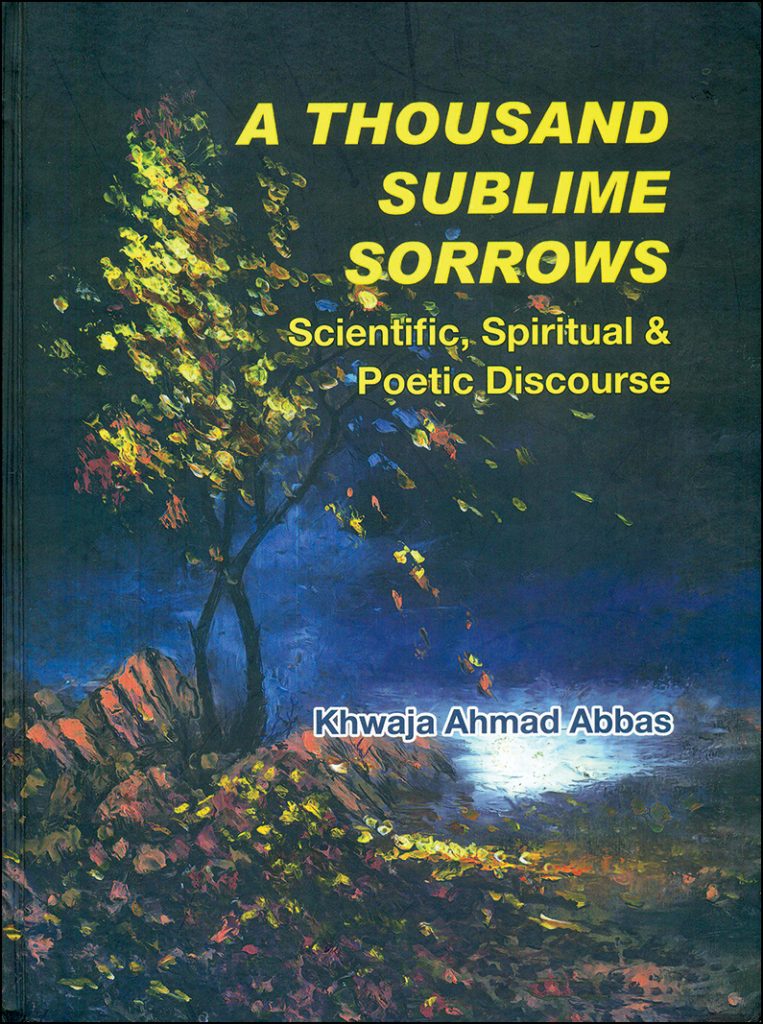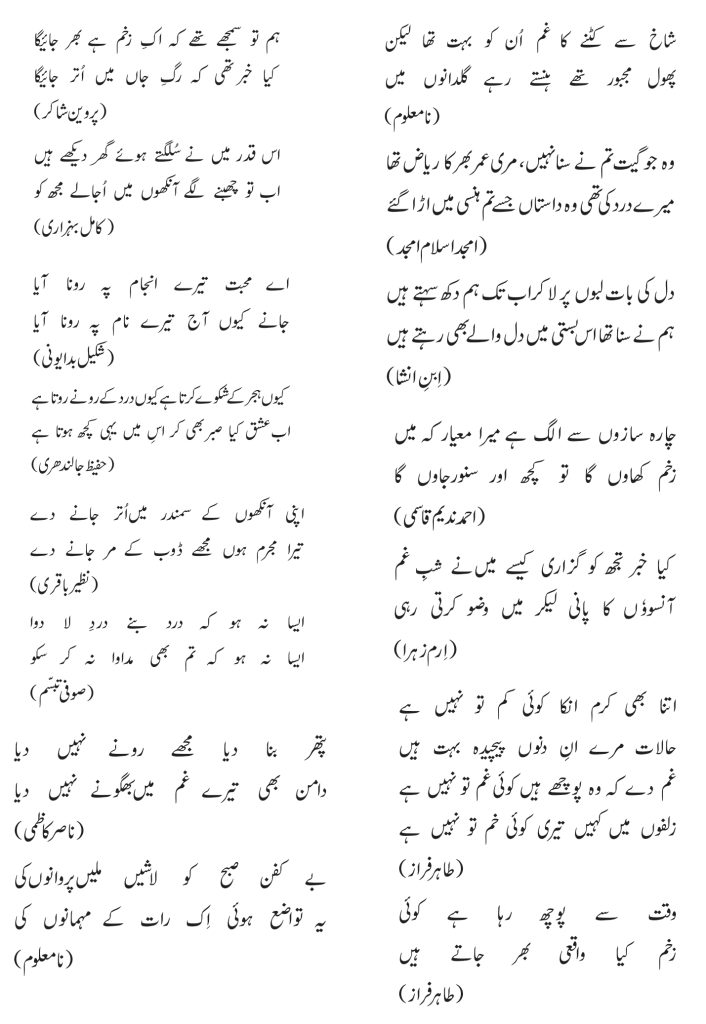Scientific, Spiritual & Poetic Discourse by Prof. Khawaja Ahmad
Abbas An excellent Profile of various aspects of Pain & Sufferings
which even the Healthcare Professionals and Medical Students will
find extremely informative and useful
ISLAMABAD: It was a pleasant surprise to receive a copy of the above titled book from Prof. Khawaja Ahmad Abbas a few weeks ago. I had known him for many decades now as an eminent pediatrician and had an opportunity to listen to him at various pediatric conferences in the country but since he is a man of very few words, a quiet personality I never had an opportunity of detailed interaction with him. The title of the book was very attractive and once I started reading it, it took me quite some time simply because first I was travelling most of the time due to some professional engagements but more so I wanted to understand it rather than just going through the pages. I have no hesitation to admit that I have never seen such a book on Pain as it is an excellent review and profile of various aspects of pain and suffering.

A view of the title of the book on Pain authored by Prof. Kh. Ahmad Abbas
an eminent pediatrician of Pakistan.
Though the book is generally meant for the public reading but even the healthcare professionals, experts and medical students will find it extremely informative and useful to understand Pain and how it affects human beings. As the author says, “the book offers some explanation and understanding of the phenomenon of pain which may enable the sufferer to bear it with fortitude”. Prof. Khurshid Hasnain former Dean Dept. of Natural Sciences at Quaid-e-Azam University has written its foreword. The contents have been supplemented with Urdu verses to make it more interesting and easy to understand.
The book has been split in various chapters i.e., Different forms and presentation of pain, Biological basis of pain, Spirituality and Mysticism, DARD the poetic discourse of pain and suffering and most of the information has been properly referenced. It contains pearls of wisdom page after page which is testimony to the hard work undertaken by the author to compile this masterpiece on Pain.
Prof. Ahmed Abbas has taken lot of pains to undertake research on this topic and since he had been himself suffering from chronic pain for many years, it persuaded him to write a book which can be rightly termed as an excellent effort for which he needs to be commended. He has described in detail how pain is related to suffering and anguish, various types of pain and their classification besides exploring the poetic discourse. He has rightly described that pain is one of the most common reasons for patients to consult a healthcare professional. American Medical Association, he writes describes “pain as an unpleasant sensation related to tissue damage”.
Diseases like cancer and severe trauma also results in severe pain which at times is unbearable and difficult to control. He lays emphasis and has rightly highlighted the importance of clinical skills i.e. taking detailed patient history and comprehensive physical examination. Pain as is well known can be mild, moderate or severe which at times is excruciating, agonizing and unbearable. Pain usually originates from the tissues which are injured or diseased. So far there are no measuring tools to assess the intensity of pain. Diabetic foot is a very serious condition which is also very expensive to treat and if neglected and not taken care of at an early stage could lead to amputation.
Hence treating physicians have been rightly advised to keep an eye on diabetic patient’s feet for any sensory impairment. Till 2006, Pakistan did not have any diabetic foot clinic and patients suffering from diabetes often had no choice but to go for lower limb amputation. Now we have almost over one hundred twenty-five diabetic foot clinics functioning all over the country which has also reduced the amputations due to diabetic foot considerably. Good physicians are expected to master the clinical skills and ensure thorough and detailed history and physical examination before ordering expensive investigations.
Doctors must explain in detail to the patients the nature of disease, ensure their participation in decision making as regards their treatment, write prescription which the chemists could easily read and also practice rational prescribing and follow professional ethics. Hippocrates is reported to have recommended the use of Aspirin to reduce pain at child birth. Pain accompanied by acute myocardial infarction commonly known as heart attack may be felt in the left shoulder, left arm or even the jaws.
Fibromyalgia is characterized by generalized aches and pain. Different placebo techniques are also used to manage pain and the one who suffers can improve if their faith is strong. He has also drawn attention towards the physical punishment at school and work place which still exists in our country. Most importantly pain is also inflicted and used as an investigative tool for criminals and spies and at times these methods could be very hazardous and extremely painful. The Limbic System, Peripheral Nervous System have been discussed at length. As he has pointed out it is estimated that each neuron is connected to another one thousand neurons. These communication channels then facilitate consultation between different parts of the brain as well as the body parts.
Pain pathways have been described beautifully in an accompanying illustration. He also points out that one feels more pain if surrounded by red color while green color is soothing. Broken heart syndrome is also known as stress induced myopathy. This is a condition which occurs after extreme stressful events like death of some close relatives or others who are considered very dear. It can also happen in case of great excitement and joy.
Different stages of grief he writes are stage of denial, stage of anger, Bargaining, Depression and finally acceptance. During the last few decades, Prof. Khawaja Ahmad Abbas writes, over nine lacs and twenty-nine thousand people died in various Muslim countries i.e. Iraq, Afghanistan, Syria, Yemen and Pakistan as a result of tussle between powerful countries who wanted to grab more powers to capture the resources of other countries like oil.
At the same time institutions like Internaitonal Monetary Fund (IMF) and World Bank though tend to help the poor are in effect busy to keep the third world countries poor which he terms as neo-colonialism but alas we have so far failed to understand it. Most of these countries in the developing Third world, he writes, lack good Governance, Justice, Rule of Law and order besides beneficial policies for the welfare of the common man. Presence of street children shows that we are a sick society which is devoid of social responsibility.
Music therapy is an established treatment modality in psychiatry practice. I myself when depressed listen to sad songs which has tremendous therapeutic effect and leads to relaxation. He has described the difference between spirituality and religion.
Sufis, he says, believe that “Die before you Die” i.e. time before physical death is transition. Self-inflicted pain and suffering is an important aspect in different faiths. Shia community commemorates the assassination of Prophet Muhammad’s grandson Hazrat Imam Hussain on Tenth of Muharam. The Devotees injure themselves using weapons of mass flagellation. The Ritual of barefoot fire walking known as Anastanaria is traditionally practiced since ancient times in Northern Greece and Southern Bulgaria. Dalai Lama the Buddhist spiritual supreme leader is quoted to have said “Tragedy should be utilized as a source of strength” while Oprah Winfrey a famous Television personality says that” Turn your wounds into wisdom”. Jibran Khalil Jibran is quoted saying “Out of suffering have emerged the strongest souls, the most massive characters are seared with scans” and “When I planted my pain in the field of patience, it bore fruits of happiness”.
He has also mentioned the names of many eminent poets of DARD who have written poems, ghazels highlighting Pain, Sorrows and Sufferings. The last chapter in the book contains poetry on this topic of Pain with their English translations. It is unbelievable as how a physician could be so much interested in literature and poetry and it must have taken him many years to compile this book. Even otherwise writing a book in a country like Pakistan is a very expensive hobby as we as a Nation lack reading habits hence sale of book is often extremely negligible and eventually authors have to bear all the expenditures. Here are a few selected couplets from different poets taken from this book for the readers to enjoy:
Prof. Khawaja Ahmad Abbas has dedicated this book to his Children Alia, Shahab and Sarmad. Quality of printing and the paper used is excellent and the title is also captivating. The Book is available from Qamar Bano Memorial Society, House 740, Street 45, Sector E-11/3, NPF Islamabad. Pages-210. Price Rs. Two thousand US Dollar Twenty-Five. For further details, contact 0300-5080475. E-mail: kabbas38@gmail.com. SAJ




